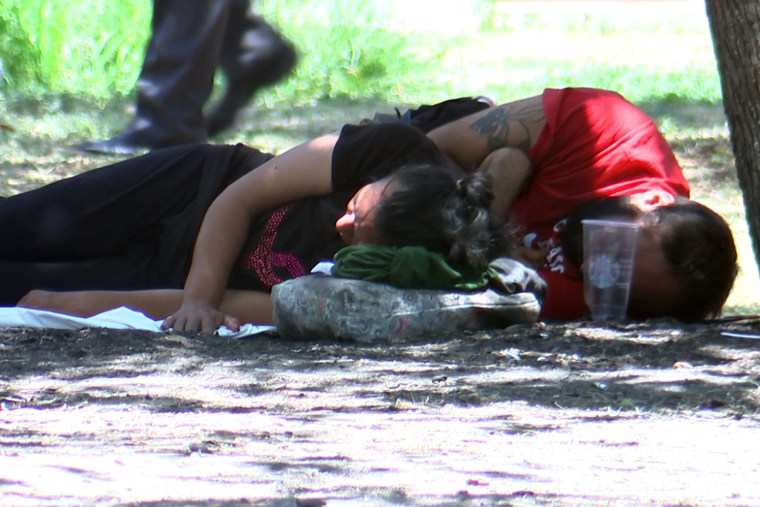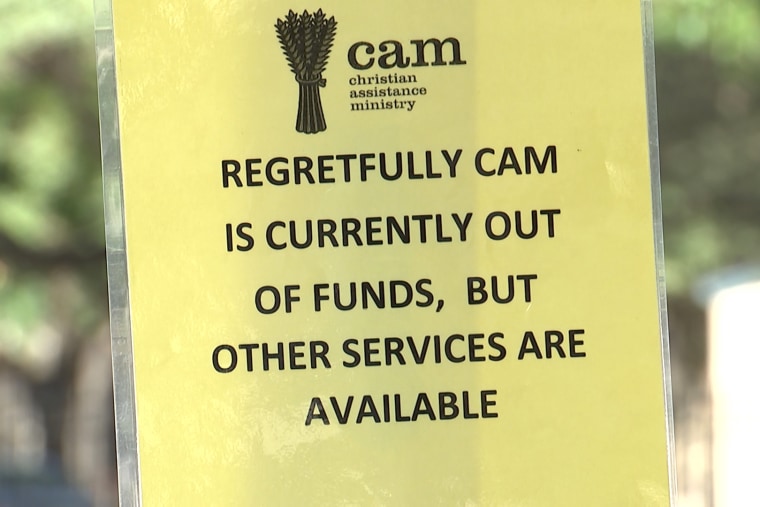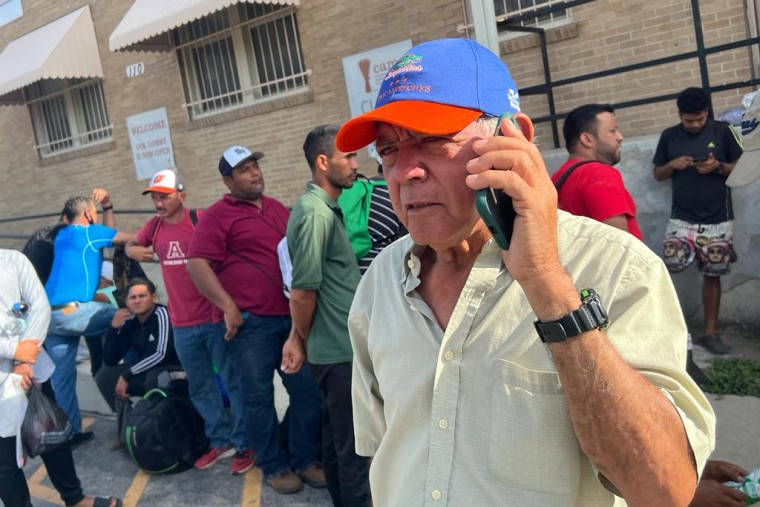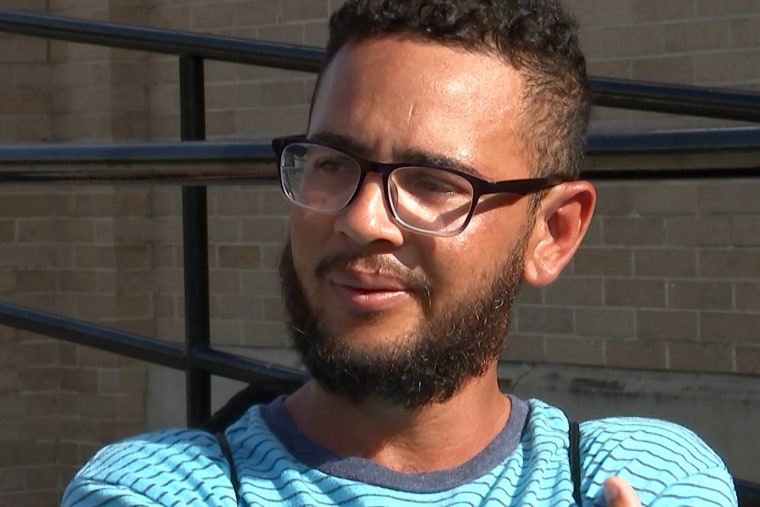Fernndez is one of the single adults arriving without family to turn to or contacts willing to help him get on his feet after he was released by U.S. Immigration and Customs Enforcement. This contrasts with the families and unaccompanied children who have been the main groups migrating to the U.S. over the past ten years.
Fernndez wound up in San Antonio because that’s where immigration officials thought he should go; he’s currently waiting for hearings about his request for asylum. He was driven the roughly 200 miles from Laredo, Texas, by an unknown person.
When I got there, the people at Immigration started asking me where I was heading. I sincerely stated that I had nowhere to go and that I didn’t have any family in the area, said Fernandez, 26. They then provided me with a location and said, “Does San Antonio suit you?” I replied “yes” to his question.

San Antonio, as well is figuring out how to assist the increasing number of asylum seekers like Fernandez, along with other cities like Washington, D.C., and New York, are grappling.
One of 15 migrants in similar situations who talked to Noticias Telemundo Investiga remarked, “I don’t have a dollar to survive on.”
However, Fernandez asserted that he believes in the American ideal of hard work and upward mobility.
Both of Fernndez’s first encounters with ICE and his first hearing before an immigration judge will take place in San Antonio, on August 25 and March 5, respectively. Absence could result in a decision to deport him without giving him a chance to defend himself in court.
WHERE ICE SENDS YOU IS HOME
The San Antonio archdiocese’s Catholic Charities believes that over half of the migrants it assists are adult singles with no contacts in the country. According to the group, there have been more of these arrivals in recent years.
The American Immigration Council reports that a third of all border apprehensions last year were made up of single individuals. Following a decline in single individuals crossing the border from Mexico during the Great Recession, a trend that lasted for nearly ten years, unaccompanied juveniles and families with children began to migrate in greater numbers.
In locations like San Antonio, asylum seekers who are awaiting their scheduled hearings frequently travel with documentation from ICE that include an address and the words “currently residing at.”

When Noticias Telemundo Investiga checked the addresses provided by the migrants, it discovered that most belonged to nonprofit organizations or U.S. contacts; however, some contacts either refused to accept responsibility for them or didn’t respond when a reporter called their respective phone numbers.
The cities and addresses to which ICE transfers migrants are selected on a case-by-case basis, according to an ICE representative in San Antonio.
The ICE spokesman stated in an email that those released from ICE detention make transportation plans and have a temporary assistance plan before their release.
The representative stated that ICE works in conjunction with neighborhood nonprofits to provide migrants with temporary housing, food, water, clothing, and transportation after their release, but she made no mention of the circumstances in San Antonio.
The asylum seeker from Venezuela, Fernandez, claimed that the address he was given was an office complex housing a nonprofit organization, which informed him that it could not at the time offer either shelter or assistance.
They claim to have no current assistance available for Venezuelans, he claimed.
He made his way to a plaza in the heart of San Antonio where other migrants gather and a church provides them with a place to stay at night.
Catholic Charities said that while neither the government nor those seeking refuge have requested authorization to use these locations, numerous of its San Antonio addresses have been discovered on immigration applications.
Although it varies depending on the location, we have heard of people turning up at our agencies without prior notification. The Department of Homeland Security makes that decision, but we are unsure of the precise location, according to Patricia Cole, national spokesperson for Catholic Charities.
The migrants are directed to hotels, churches, or shelters by Catholic Charities in San Antonio. It aids in purchasing tickets for migrants, but the cost of doing so is difficult given the strong demand, the group claimed.
We never abandon anyone in the street. Antonio Fernandez, president and chief executive officer of Catholic Charities in San Antonio, said, “We send them wherever we can. He did however note that despite receiving federal funding and private donations, the organization is unable to offer long-term housing.
According to Fernandez, the group will be in charge of running a new shelter and anticipates funding from the Federal Emergency Management Agency.
Approximately 500 of the 600 migrants who arrive in San Antonio each day require housing for at least their first night, according to Roland Martinez, public relations manager for the city of San Antonio. Around 185,000 migrants have gone through San Antonio since April 2021. The majority go on to other regions of the nation.
Arriving at the airport or the downtown Greyhound bus station for weeks now have been migrants who had been released by ICE at the border or in San Antonio.
In order to accommodate individuals who had just arrived for a short period of time as they awaited their connections to other areas of the country, San Antonio erected a temporary center on July 7.
According to the city, it is a secure and friendly location for migrants passing through San Antonio.
According to Noticias Telemundo, the center had to be shut down after two weeks since it was above capacity and the city needed more assistance from the federal government.
Two boys waited in line at Christian Assistance Ministry in San Antonio for breakfast to go, a shower, and clean clothes alongside recent migrants and city residents who are temporarily homeless.
They are being sent to San Antonio, according to Executive Director Dawn White-Fosdick, because the greater number of immigrants entering the country has beyond the capacity of the philanthropic organizations in border communities.
ATTEMPTING TO RESET
Asylum seekers who have been released as they wait for their meetings with immigration authorities carry monitoring cell phones as an alternative to incarceration in private jails. However, the mobile devices are only allowed to be used to take a weekly photo that is required by immigration authorities for monitoring. They cannot be used to make phone calls.
After adventures that have robbed them of what they had anticipated would sustain them through their new start in the U.S., many border crossers find themselves struggling.

Many others shared stories about how their funds ran out, their money was snatched, or their telephones were stolen when they crossed the border.
Due to their limited options, they venture out onto the streets early dawn in an effort to find a local resident who will hire them for a few hours of construction labor, home maintenance, or other odd jobs.
I went out this morning to hunt for a job, said Nicole, a 22-year-old Venezuelan. When she went outside that morning, she couldn’t find one. This section seems challenging.
She exchanges advice on jobs and hourly pay with Julin, a Colombian who, like her, had no luck that day hunting for work among the establishments in San Antonio’s tourist district. He said, “They informed me my documents weren’t good enough for work.”
AN ENDPOINT, BUT AN EFFORT TO GET THERE
While awaiting their immigration hearings, some freshly arrived asylum seekers claimed they had been allocated to other cities like Washington, D.C., or Orlando, Florida, but they were unable to go there from San Antonio.
Jordan and Mendoza Alvarado, two Venezuelan brothers who are 30 and 20 years old, were seeking for a means to travel to the address they had been assigned to while waiting for a shower at the Christian Assistance Ministry. To get to Houston, their first stop, where they would try to work to gather money for the next trip, they would need to raise roughly $20. Additionally, they were searching for new shoelaces to replace the ones that were lost after they were released from immigration custody.

They looked for a phone to use and attempted to call the number listed on their documents. The English automatic menus on the charitable organization’s phone message, however, proved impossible for the brothers to navigate. When they arrived at Orlando, their final destination, they were unsure if they would have a place to stay.
Mendoza Alvarado declared that they will continue moving forward regardless of what happened in the future.
I have no issues, he declared. “We continue to fight.”
An earlier version of this story was first published in Noticias Telemundo.
Follow
ESPN Latino
for the Facebook, Twitter, and Instagram.













